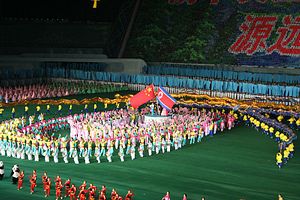North Korea recently issued an internal decree slamming Xi Jinping and the Chinese Dream, according to a prominent website run by North Korean exiles.
Earlier this month, New Focus International reported that the Central Party Committee of the Korean Workers’ Party issued an internal decree in late April ordering DPRK officials to “abandon the Chinese dream.”
“Xi Jinping is a figure who regards the suffering of the Cultural Revolution as resulting from the repressive nature of the Chinese Communist Party,” the decree said, according to New Focus International. “In the past, the Chinese Communist Party was in revolutionary fellowship [with North Korea]…. But today’s Chinese Communist Party is a Xi Jinping style party of selfishness, pursuing reforms and opening, and therefore choosing to put money before ideology.”
The decree also accused China of being in “bed with the imperialists and dreaming dreams with them” as evidenced by China’s opposition to North Korea’s nuclear program.
New Focus International said a follow-on edict issued by the KWP’s central committee ordered state sanctioned trading companies to reduce their dependence on China and increase their trade with Russia and other European nations. The article notes that similar decrees about reducing Pyongyang’s reliance on China were issued by Kim Jong-il in 2000 and 2002.
While The Diplomat cannot independently verify the report, New Focus International has great sources inside the North Korean regime. Run by North Korean exiles from all levels of society, NFI was founded and is directed by Jang Jin-sung, a former counterintelligence officer in North Korea and poet laureate under Kim Jong-il. Jang, who was one of the “accepted” under Kim Jong-il, recently published a fascinating memoir about his time in the North Korean regime, as well as his daring escape. NFI’s three other senior editors are also former DPRK officials.
Moreover, the report is consistent with the trend lines in Sino-North Korean and North Korean-Russian relations in recent months. As The Diplomat reported in March, North Korea has hung signs again at its military academies that call China a “turncoat and our enemy.”
Similarly, late last year Kim Jong-Un’s powerful uncle, Jang Song-Thaek, was purged from the regime and immediately executed. Jang was known to be close to China, particularly economically, and some of the charges brought against him suggested that his business ventures with China were part of the reason for his demise.
Even as Sino-North Korean relations have plummeted, Pyongyang’s ties with Russia has been on the upswing over the last year or so. Most notably, in April Russia officially agreed to forgive 90 percent of North Korea’s substantial debt to it dating back to the Cold War, and offering favorable repayment terms for the remaining 10 percent.
Moreover, just days after the NFI report appeared online, Russia and North Korea held a session of their “Intergovernmental Commission on Trade, Economic, Scientific and Technical Cooperation.” At the conclusion, the two sides announced a slew of deals which, if implemented, would mark a substantial increase in their commerce.
What is particularly revealing, as KGS Night Watch noted, is that the details of the agreement strongly suggest that Russia is in effect substituting for the role China currently plays in various sectors in North Korea. “What is striking,” Night Watch noted, “is that the trade and development menu resembles the kinds of projects that the late Chang Song-taek was arranging, but with Chinese investors. Kim Jong Un has decided to make similar arrangements with the Russians.”
Even Russian Far East Development Minister Alexander Galushka said of parts of the agreement: “the North Korean Government has allowed this agreement exclusively for Russian entrepreneurs and that overseas investors, including China, have not enjoyed such benefits to date.”

































